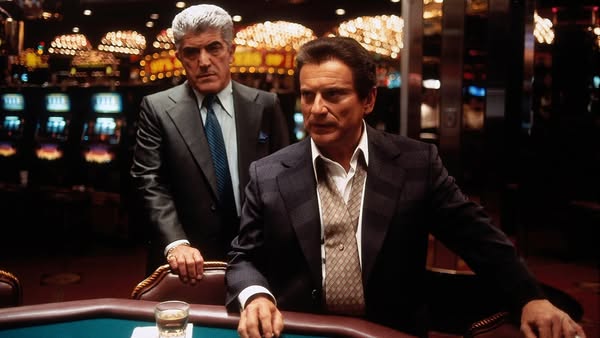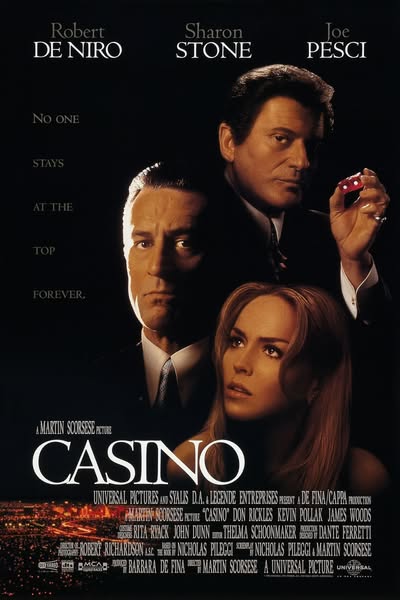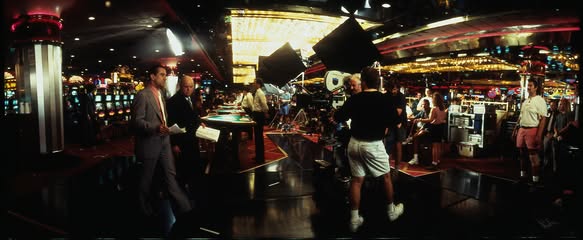Casino (1995)

Casino (1995) is a masterful exploration of greed, power, and the dark underbelly of Las Vegas, directed by Martin Scorsese. This crime drama, based on real events, delves into the lives of individuals entangled in the world of high-stakes gambling and organized crime. With its intricate storytelling and rich character development, Casino stands as a significant entry in Scorsese’s illustrious filmography, showcasing his talent for crafting compelling narratives that captivate audiences.
The film centers around Sam “Ace” Rothstein, portrayed by Robert De Niro, a skilled gambler who is tasked with running the Tangiers Casino in Las Vegas. Ace’s sharp instincts and expertise in the gambling industry enable him to transform the casino into a lucrative venture. However, his success draws the attention of the mafia, leading to a complex web of power struggles and moral dilemmas. As Ace navigates the challenges of managing the casino, he is joined by his volatile friend Nicky Santoro, played by Joe Pesci, whose ruthless nature brings an element of danger to the narrative.

At the heart of Casino lies a love story between Ace and Ginger McKenna, a glamorous con artist portrayed by Sharon Stone. Their tumultuous relationship serves as a reflection of the film’s broader themes of ambition, betrayal, and the pursuit of the American Dream. Ginger’s character adds depth to the narrative, illustrating the personal costs of a life driven by ambition and desire. The dynamic between Ace and Ginger is both passionate and destructive, showcasing how love can be influenced by external pressures and personal insecurities.
The film’s structure is notable for its use of voiceover narration, primarily from Ace and Ginger, which provides insight into their thoughts and motivations. This narrative style effectively immerses viewers in their world, allowing for a deeper understanding of the characters’ complexities. Scorsese’s direction skillfully intertwines these personal stories with the larger narrative of Las Vegas, highlighting the city’s allure and the moral decay that often accompanies wealth and power.

Visually, Casino is a feast for the eyes, characterized by Scorsese’s signature style. The cinematography captures the glitz and glamour of Las Vegas while simultaneously revealing its darker aspects. The vibrant colors and dynamic camera movements create an engaging atmosphere that reflects the excitement and danger of the casino world. Scorsese’s meticulous attention to detail is evident in every frame, as he artfully constructs scenes that resonate with both beauty and tension.
The film’s soundtrack also plays a vital role in establishing its tone, featuring an eclectic mix of classic rock and period-appropriate music that enhances the emotional weight of key scenes. The use of music elevates the storytelling, further immersing viewers in the hedonistic world of Las Vegas during the 1970s and 1980s.
Casino does not shy away from depicting the brutal realities of the gambling industry and organized crime. The film explores themes of loyalty, betrayal, and the inevitable consequences of a life steeped in greed. As Ace and Nicky’s relationship deteriorates, the film highlights how ambition can corrupt even the strongest bonds. The violence and moral ambiguity depicted in the film serve as a stark reminder of the costs associated with the pursuit of power and success.

The performances in Casino are exceptional, with De Niro delivering a nuanced portrayal of a man caught between his ambitions and the chaos surrounding him. Joe Pesci’s performance as Nicky is both intimidating and magnetic, showcasing his ability to portray raw intensity. Sharon Stone shines as Ginger, capturing the character’s vulnerability and ambition with remarkable depth. The chemistry among the trio adds a layer of complexity to the narrative, making their interactions both compelling and tragic.
In conclusion, Casino is a riveting exploration of the intersection between ambition and morality, set against the dazzling yet treacherous backdrop of Las Vegas. Through its intricate storytelling, powerful performances, and striking visuals, the film captures the allure and danger of a world driven by greed. Scorsese’s masterful direction and the film’s rich character development ensure that Casino remains a standout in the crime drama genre, leaving a lasting impact on viewers and solidifying its status as a cinematic classic.











